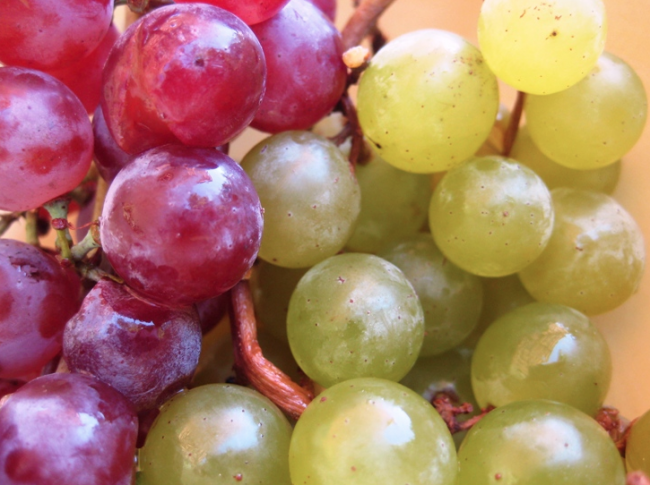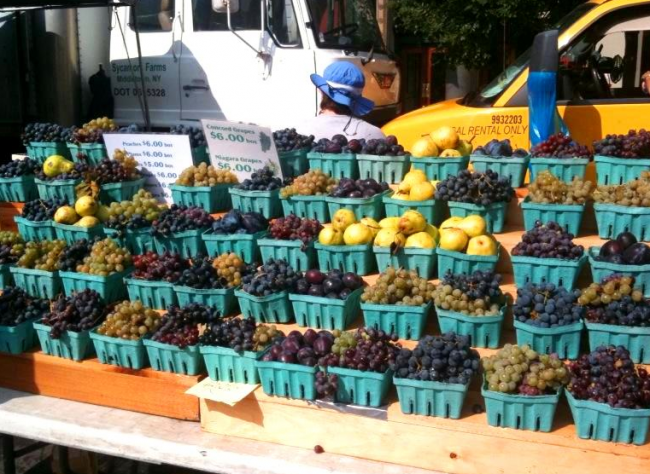Meet Your Vegetables: Grapes and Things That Taste Like Themselves
by Jaime Green

When I was a freshman in college, a friend of mine wrote a play for her senior thesis, a play about, I think, Samuel Coleridge and his sister and another poet. (I’m not looking it up because let’s see what I remember from those frighteningly many years ago.) Gertrude Stein and Alice B. Toklas were also characters. (This friend is now a successful playwright, so well done there.) There was a lot about writing, and a little about an asthma attack, and also, at one point, Gertrude said to Alice, or Alice said to Gertrude, “Salt makes things taste more like themselves.”
I realize now that this was not the first time that idea was put together, but it was the first time I’d heard it, and my eighteen-year-old mind was, if not blown, then struck pretty strongly. I still think of it often. Not even so much in context of salting things, although I do that pretty often, and often intone that the secret to making vegetables delicious is salt, oil and heat (Brussels sprout season is coming so soon!), but more in terms of the fruits and vegetables at the farmers market, and the broader idea of when foods taste more like themselves.
(I think I even invoked this back in my past life, you know, in 2008, when I spent as much time doing my work as defending it, dramaturgs being, to people who know what they are, much maligned. Evil agents of theatres that want to dilute plays until they are spark-less and sucky, turning them into what Artistic Directors think their audiences can stomach rather than what the playwrights want them to be. But all I was trying to do was help playwrights write the best version of their play. And I think I did, sometimes. But maybe it was all about vegetables. Like a successful play tastes more like itself.)
I think, before I started being like, holy shit this green pepper tastes like a green pepper!, I’d encountered this idea by way of hearing people talk about grass-fed, pasture-raised, generally happy chicken. It might’ve been in The Omnivore’s Dilemma, because why not give that book yet more credit, where Michael Pollan helps slaughter a chicken, and then eats it, and then is like, holy shit this chicken tastes like chicken! (It’s something like that, I think.) We’ve spent all our lives thinking we know what chicken and green peppers taste like (in both cases sort of bland and inoffensive, bordering on flavorless), but then we meet a chicken that’s eaten what chickens are supposed to eat, or a green pepper that hasn’t been on a truck for a week, and we’re like, holy shit, I had no idea.
But so I’d heard and/or read that grass-fed chicken tastes like chicken, like something. More powerfully like itself. And I bought some greenmarket apples and not only were there more options than supertart Granny Smith, mushy Golden Delicious, or gross Red Delicious that makes my tongue feel all dry (does that happen to anyone else?) but these apples had all sorts of flavors! Flavor profiles, you could even say, assuming that phrase refers to the sorts of complex flavors we’re told can be found in wine, cheese, coffee and things like that. (I bought a bottle of wine the other day, and the wine store guy kept trying to translate my “I like Pinot Grigio and hate Chardonnay” into preferences of tropical vs. stone fruit, issues of richness and fullness and finish and I was like, dude, I have no idea, I just have the DVD of Bright Young Things to get home to, and let’s keep this around ten bucks.) But back to apples. It was like, Oh! So this is what apples taste like!
(There is the sad flip-side of this, around January when there’s nothing left at the farmers market other than apples-still delicious, if tiresome-onions and potatoes, and I get a bunch of overpriced kale from Whole Foods, or some broccoli from the supermarket by me, and it’s like, bleh, this tastes like nothing. I’ve been gorging on vegetables this summer, as if that can somehow stave the winter off.)
After, what, three years, I consider myself an old hand at this greenmarket thing. The produce tastes better, is fresher, I say “hey” to the farmers and most of the time it’s cheaper. I only rarely, any more, try new vegetables. There are rarely any more any new vegetables to try. I got pretty excited this summer about, though I’d seen them summers before, purple carrots (taste mostly like regular carrots, are prettier), and yellow-white and purple bell peppers. (The purple ones were a little bitter, the yellow-white ones looked ghosty and turned orange as they went overripe.)
I’d also seen grapes before, but hadn’t bought them before this year. They show up in late summer, in crates with cardboard “NO SELF-SERVE” signs, with little baskets of samples and a cloud of hovering bees. I’d even tasted grapes from the sample baskets, and loved them, I’m sure, but this year for the first time I’ve been buying grapes. Taking grapes home and then running to whomever’s around saying, “Oh my God, you have to try this,” and then expectantly watching their face for the moment the grape bursts open in their mouth, and the taste hits them. I don’t expect anyone to be as excited as I am, though that would be nice, but I worried that some of the wows were for my benefit.

But how can you not be wowed? I’m sure they, like me, especially in the case of my sister, where I know for sure, have grown up on supermarket grapes. A little sweet and refreshing, but miles away from the sweet smack of grape juice. Maybe we’ve wondered at this, but no more seriously than we wondered about the distance between grapes and grape candy (or Dimetapp), not much more than we faced the Slurpee machine and wondered where actual raspberries came in blue.
Maybe, a little older, we wondered about the distance between the grapes we’ve known and the taste of wine. Could fermentation be doing all the work, coaxing complexities out of these innocuous things we’ve picked from fruit salads our whole lives? Maybe we didn’t wonder about this. I’m not sure I ever did, but I should have.
Maybe it’s because I didn’t grow up in wine country, have maybe never seen grapes on the vine. My grandfather fed me carrots straight from the garden, and I remember how sweet they were, but I never got the chance with grapes. (I think the only raspberries I ever ate as a kid were from his backyard, but almost nothing meets that standard now.)
But so now, this year, I have been buying New York State grapes, tiny little grapes with names like Jupiter and Mars. They obviously come in varieties beyond “green” and “red.” They come in red and deep black-purple, and burst tart and almost cloyingly sweet at once, with that complexity of flavor that is what the guy at the wine store was probably talking about.
And my first thought, the thought I’m trying to spark for all the friends whose faces I’m shoving these into, is a revelation: Oh my God. This is what a grape really tastes like!
And at first it’s thrilling-grape juice finally makes sense-and it’s delicious and this long-lost secret is back, and in my fridge, and I’m so excited to have these in my city, to savor the month or two of their season.. But then I start to wonder, where have these grapes been my whole life? Why are they selling the flavorless grapes, telling us that those are what grapes are? (Something something, simulacrum. Something something, The Matrix.) I can’t help feeling like I’ve been had.
Previously: Radish Chips
Asparagus is Here!
The Farmers Market in Winter
Jaime Green hopes you’re even half as excited about Brussels sprouts as she is.
